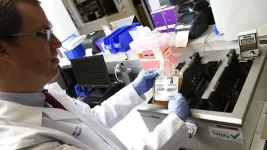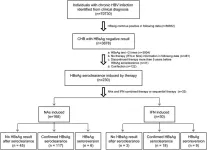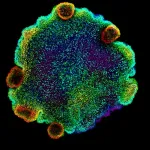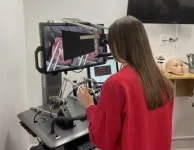(Press-News.org) Findings from a nationwide, multicenter study led by Johns Hopkins Medicine and the Johns Hopkins Bloomberg School of Public Health suggest that patients with COVID-19 have less chance of developing post-COVID conditions — commonly known as long COVID — if they receive early treatment with plasma from convalescent (recovered) COVID patients that contain antibodies against SARS-CoV-2, the virus that causes COVID-19.
The new research, first posted online today in mBio, a journal from the American Society for Microbiology, is a follow-up investigation to the 2021 clinical trial that showed convalescent plasma is an effective and safe option as an early outpatient treatment for COVID-19. The latest study looked at the long-term outcomes of a large portion of the participants from the 2021 clinical trial.
“Following our initial study, health care professionals kept SARS-CoV-2 antibody-rich blood plasma available in their blood banks as part of the treatment arsenal against COVID-19 in people who are immunocompromised; and now, our new findings show it also may lower the risk of post-COVID conditions,” says study co-lead author David Sullivan, M.D., professor of molecular microbiology and immunology at the Johns Hopkins Bloomberg School of Public Health with a joint appointment in infectious diseases at the Johns Hopkins University School of Medicine.
The original outpatient early treatment clinical trial was conducted between June 2020 and October 2021. The researchers provided 1,181 randomized participants with one unit each of either polyclonal high-titer convalescent plasma (containing a concentrated mixture of antibodies specific to SARS-CoV-2) or placebo control plasma (with no SARS-CoV-2 antibodies). The participants were 18 and older, and had tested positive for SARS-CoV-2 within eight days prior to transfusion. A successful outcome was defined as not requiring hospitalization within 28 days after plasma transfusion.
The original clinical trial found that 17 participants out of 592 (2.9%) who received the convalescent plasma required hospitalization within 28 days of their transfusion, while 37 out of 589 (6.3%) who received placebo control plasma did. This translated to a relative risk reduction for hospitalization of 54%.
As part of the clinical trial, 882 participants also were evaluated for their levels of 21 different cytokines and chemokines at screening, and at 14 days and 90 days after they received either convalescent plasma or placebo control plasma. Cytokines and chemokines are signaling proteins secreted by cells in response to infection, and as a result, activate specific immune system functions such as inflammation. In turn, excessive or unchecked inflammation is believed to be a key factor in the development of post-COVID conditions.
For the latest study, the researchers used the cytokine and chemokine measurements, along with reports by patients of any post-COVID conditions at the 90-day examination, to determine if there was any association between early convalescent plasma therapy and long COVID symptoms. Statistical analyses were conducted to validate the findings, after adjusting for other factors that could make someone more prone to post-COVID conditions, such as demographics (e.g., age and race), competing diseases (e.g., diabetes) and vaccine status.
At 90 days after receiving either convalescent or control plasma, 590 (66.9%) of the study participants showed no post-COVID conditions, while 292 (33.1%) did. Of the latter group, the most commonly reported symptoms were fatigue and anosmia (loss of smell).
Levels of cytokines and chemokines were elevated at screening for most of the study participants, and decreased more by day 90 in those who had received convalescent plasma,” says study senior author Aaron Tobian, M.D., Ph.D., director of the Transfusion Medicine Division and professor of pathology at the Johns Hopkins University School of Medicine.
Additionally, study participants who had higher-than-normal levels of one particular cytokine, interleukin-6 (IL6), at screening were more likely to be among those with post-COVID symptoms by day 90. IL6 is known to trigger an inflammatory response in humans.
“Our study is among the first to show that elevation of IL6 early after the onset of infection is associated with post-COVID conditions,” says study co-lead author Kelly Gebo, M.D., M.P.H., professor of medicine at the Johns Hopkins University School of Medicine. “While cytokine levels decreased throughout the study population from infection to day 90, they dropped more significantly in those who received convalescent plasma early in the course of their illness. So, it appears that when IL6 levels remain elevated during the COVID-19 recovery phase, it likely contributes to post-COVID conditions.”
Future studies, says Gebo, could examine the impact of anti-IL6 agents combined with other treatments against COVID-19 among outpatients.
Because of the large number of co-authors on this study, their names, financial disclosures and conflict-of-interest statements are not listed here. That information may be found in the published paper.
The study was principally funded by the U.S. Department of Defense’s Joint Program Executive Office for Chemical, Biological, Radiological and Nuclear Defense (DOD JPEO-CBRND), in collaboration with the Defense Health Agency (DHA). Initial support was received from the Bloomberg Philanthropies and the state of Maryland, with additional support coming from National Institute of Allergy and Infectious Diseases grant 3R01AI152078-01S1 and the agency’s Division of Intramural Research, National Center for Advancing Translational Sciences grant U24TR001609, the Mental Wellness Foundation, the Moriah Fund, Octapharma Plasma, the HealthNetwork Foundation and the Shear Family Foundation.
The views expressed are those of the authors and should not be construed to represent the positions of the U.S. Army or the U.S. Department of Defense. The data and opinions presented do not reflect the view of the U.S. government.
END
Early convalescent plasma use — helpful in avoiding severe COVID — also may lower long COVID risk
2023-09-19
ELSE PRESS RELEASES FROM THIS DATE:
Machine learning analysis of research citations highlights importance of federal funding for basic scientific research
2023-09-19
Biomedical research aimed at improving human health is particularly reliant on publicly funded basic science, according to a new analysis boosted by artificial intelligence.
“What we found is that even though research funded by the National Institutes of Health makes up 10% of published scientific literature, those published papers account for about 30% of the substantive research — the important contributions supporting even more new scientific findings — cited by further clinical research ...
Fast-track strain engineering for speedy biomanufacturing
2023-09-19
Using engineered microbes as microscopic factories has given the world steady sources of life-saving drugs, revolutionized the food industry, and allowed us to make sustainable versions of valuable chemicals previously made from petroleum.
But behind each biomanufactured product on the market today is the investment of years of work and many millions of dollars in research and development funding. Berkeley Lab scientists want to help the burgeoning industry reach new heights by accelerating and streamlining the process of engineering microbes to produce important compounds with ...
Firearm violence exposure in Black and American Indian/Alaska Native communities linked to poorer health
2023-09-19
There is a widening health disparity among Black, American Indian and Alaska Native adults exposed to gun violence, according to Rutgers researchers who say these communities have more mental and physical health issues because they witness or are victimized at a higher rate.
In a new study published in Health Affairs Scholar, 3,015 Black and 527 American Indian/Alaska Native (AI/AN) adults residing in the United States were surveyed between April and May 2023.
Participants were asked whether they were threatened with a firearm, shot with a firearm, had a family or friend shot with a firearm, or witnessed or heard about a shooting. The results found that these ...
New evidence indicates vitiligo-associated autoimmunity may contribute to reduced morbidity and mortality risk
2023-09-19
Philadelphia, September 19, 2023 – According to a new study comparing patients with and without vitiligo in South Korea, patients with vitiligo were associated with a 25% decreased risk of mortality compared with controls. This suggests that vitiligo-associated autoimmunity may play a role in reducing morbidity and mortality. The results appear in the Journal of Investigative Dermatology, published by Elsevier.
Previous studies have documented a reduced risk of cancer in patients with vitiligo, however, there has been limited research on the relationship between vitiligo-associated autoimmunity and the risk of morbidity and mortality ...
Eurosceptics more likely to think of the EU as less democratic than it is, study shows
2023-09-19
A significant share of voters see the EU as less democratic than it really is and believe the European Commission can steamroll its member states, a new study shows.
The research shows that key channels of legitimation in the EU are not well known by the citizens of large member states. Whether people see themselves only as citizens of their nation, or simultaneously as a European, is linked to what they believe about the EU.
A substantial share of EU voters who took part in the study believed that the members of the European Parliament are not directly elected. Many assumed the European Parliament is unimportant for decision ...
Poor water, sanitation, and hygiene in low-income countries may help fuel the emergence of deadly pathogens
2023-09-19
A new study suggests that Escherichia coli and other disease-causing microbes are passing easily between humans and animals in Cambodia, a country where clean water, sanitation and hygienic controls are lacking in many regions. The continuous exchange, along with unregulated antibiotic use, leads to the emergence and spread of drug-resistant E. coli, the authors say.
Maya Nadimpalli, a scientific collaborator at the Antibiotic Research Action Center at the George Washington University and her international colleagues, conducted the research in Phnom Penh, an urban area where humans and animals are often living in close proximity without clean water or other ...
Durability of hepatitis b surface antigen seroclearance studied in real-world data from electronic health records
2023-09-19
In a study published in the journal Genes & Diseases, researchers from The Second Affiliated Hospital of Chongqing Medical University analyzed data from an extensive dataset comprising over 70,000 HBsAg-positive individuals at The Second Affiliated Hospital of Chongqing Medical University. They compared two groups: those achieving HBsAg seroclearance through NAs monotherapy (168 patients) and those through IFN monotherapy (30 patients). NAs monotherapy patients were older, with a higher proportion achieving HBsAg seroclearance during ...
Tiny sea creatures reveal the ancient origins of neurons
2023-09-19
A study in the journal Cell sheds new light on the evolution of neurons, focusing on the placozoans, a millimetre-sized marine animal. Researchers at the Centre for Genomic Regulation in Barcelona find evidence that specialized secretory cells found in these unique and ancient creatures may have given rise to neurons in more complex animals.
Placozoans are tiny animals, around the size of a large grain of sand, which graze on algae and microbes living on the surface of rocks and other substrates found in shallow, warm seas. The blob-like and pancake-shaped creatures are so simple that they live without any body parts or organs. These animals, thought to have ...
Argyle study reveals crucial third clue to finding new diamond deposits
2023-09-19
Curtin University researchers studying diamond-rich rocks from Western Australia’s Argyle volcano have identified the missing third key ingredient needed to bring valuable pink diamonds to the Earth’s surface where they can be mined, which could greatly help in the global hunt for new deposits.
While it is known that for diamonds to form there needs to be carbon deep in the Earth, and for these diamonds to turn pink they must be subjected to forces from colliding tectonic plates, the new study has found the third ingredient needed for the presence of pink diamonds at surface ...
Assessing unintended consequences in AI-based neurosurgical training
2023-09-19
Virtual reality simulators can help learners improve their technical skills faster and with no risk to patients. In the field of neurosurgery, they allow medical students to practice complex operations before using a scalpel on a real patient. When combined with artificial intelligence, these tutoring systems can offer tailored feedback like a human instructor, identifying areas where the students need to improve and making suggestions on how to achieve expert performance.
A new study from the Neurosurgical Simulation and Artificial Intelligence Learning Centre at The Neuro (Montreal Neurological Institute-Hospital) of McGill University, ...





